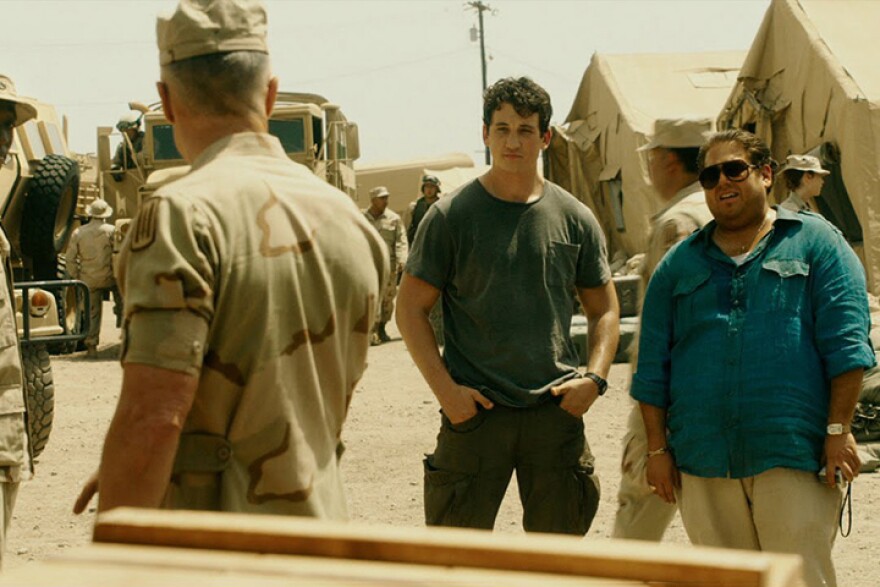As a fledgling screenwriter, Stephen Chin traveled to war-torn Iraq and lived to tell some of his stories in "War Dogs"; Cubans get current TV programming from the U.S. and other countries illicitly, but openly, through a home-delivery service; Paramount's woes continue with its big budget remake of a famous period film.
'War Dogs' screenwriter: Driving through Iraq's 'triangle of death' was easier than dealing with studio heads
In the film “War Dogs,” Jonah Hill and Miles Teller play 20-somethings who improbably become high-level arms dealers.
It’s based on the true story of David Packouz and Efraim Diveroli, who, in 2007, won a $300 million government contract to arm America's allies in the Middle East.
Fledgling screenwriter Stephen Chin had read about the story in publications like "Rolling Stone," but didn’t think he could tell the story accurately just based on other accounts. The Ivy League-educated Chin knew he needed to visit Iraq to get to the bottom of the story.
As Chin told The Frame’s John Horn, at the time his career as a producer was moving along, but he really wanted to be a writer. So he decided to take a chance on adapting the story for the screen.
Interview Highlights:
Nobody wanted to represent me. Nobody was really interested in representing me. Nobody was interesting in reading my scripts. I was having a very difficult time. And I tried to option an article about two young entrepreneurs — not the guys in "War Dogs" — who had gone to Iraq, who'd faked journalist IDs and snuck in with the first journalists thinking they were going to get oil contracts and become billionaires. They were kind of a joke sidebar in this GQ article. I tried to option their story from GQ — I couldn't option it. Nobody was giving me any help and I wasn't getting anywhere. Then a buddy of mine, a colleague of mine, an executive in the business who had known me for many years said, why don't you just go to Baghdad and get their life rights? I was like, what are you talking about, go to Baghdad? He was like, c'mon you've done all these dangerous things in your life. You've...
Told studio executives you didn't like their notes!
(Laughs) Worked with Larry Clark, worked at Miramax. You know, all these dangerous, crazy things.
If you survived Harvey Weinstein, you can survive Baghdad?
His attitude was, how dangerous can it be? You were in the army. Go. Go do it. I was like, well why don't we go together and he was like, oh no I can't go. I was born in Tel Aviv. I can't go to the Middle East. But you go. You go to Baghdad. I thought about it and my career was absolutely nowhere and I was really at that breaking point where I was like, I've got to go back to producing or I have to do something else because I can't pay the bills. I'm not making enough money as a writer to pay my medical insurance. So I called a buddy who was at "US News and World Report" and I said, so how do guys go into Baghdad. He said, let me call some friends. And he called me back and said, so it turns out, you can't get on the plane because the Army has those seats and you can't get on the plane. But, we use these smugglers. There's a fixer in Amman, Jordan and you hire these GMC's and it's $1,500. But you should really rent two because one needs to be the decoy car. I was like, what is a decoy car? He said, well if the bad guys chase you it's really important that the cars split up and you have a 50/50 shot of not getting caught by the bad guys.
Watch the 50/50 scene in "War Dogs"
So, I actually took $10,000, bought some really sketchy body armor, flew to Amman, Jordan and I waited at the Amman Hilton at midnight for a guy named Abu Almar who was supposed to be an Arab guy with a mustache, which basically describes every man in the lobby. He didn't speak any English and I didn't speak any Arabic. I drove with him at midnight to Baghdad and, ironically, I don't really talk about this. Nobody knows that I did this. So when I met with Todd Phillips on "War Dogs," he said, I've read this script of yours, this blacklist script, "I Rock Iraq." It's an amazing script. It feels so real. You feel like you're there. There's all this incredible detail. How is there all that detail? I said, well, because I was there. He said, what do you mean? You were there? I said, yeah, yeah. I went to Baghdad.
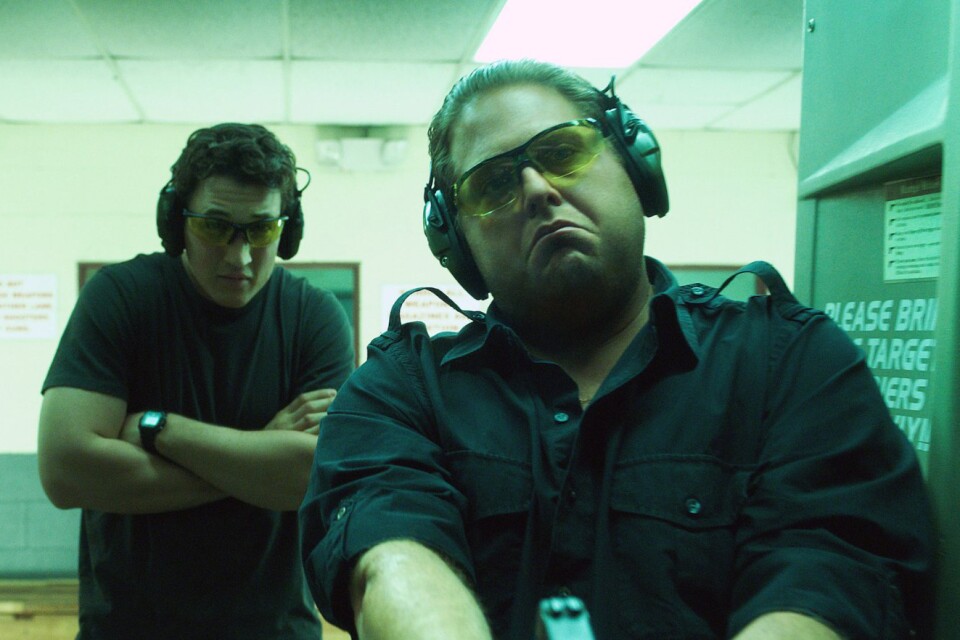
This thing you did as a journalist/screenwriter ends up in War Dogs even though it didn't happen to the guys in War Dogs?
That's right.
This is an interesting idea coming back to the whole idea of what does based on a true story mean? So this was not something that happened to the two gun runners — Efraim Diveroli and David Packouz. In real life, it happened to you...So how do you end up merging your life experience with their life experience?
Todd — from the beginning I think — probably intended and hoped that we would put that in there. He was very gracious about it and saying at some point, Stephen, I don't want to cannibalize your life, but it would be great if we could use that episode. I told him that we had stopped for gas in Fallujah and my guy disappeared and I thought he was giving me up to be kidnapped. I got out of the car and I ended up talking to these guys who turned out to be bad guys and I had no idea. So the driver came out, screaming and yelling at me shoving me in the car telling me, go, go, go. Fallujah bad. I had no idea we were in Fallujah. I was like, we're in Fallujah? You're kidding me. You stopped for gas in Fallujah? We ended up getting chased.
Todd was like, that's a great story. We should use that. The second answer to your question is, I think more than many studio writers, I'm very interested in finding the real story. You talked about the journalistic thing. When you come to something that's a true story. First of all, you have that responsibility. I was motivated to do this in large measure because I saw these guys, Efraim and David, as a real way to tell an accessible story — as a way into the story about the war, about the economics of war, about the gigantic military industrial business that rose up around the war. So I wanted to be deeply true to their story. I was also very interested in the procedural. I thought audiences would also be really interested. How does somebody who's a 19-year-old kid, not just work the internet and get the contract, how does he actually pull it off?
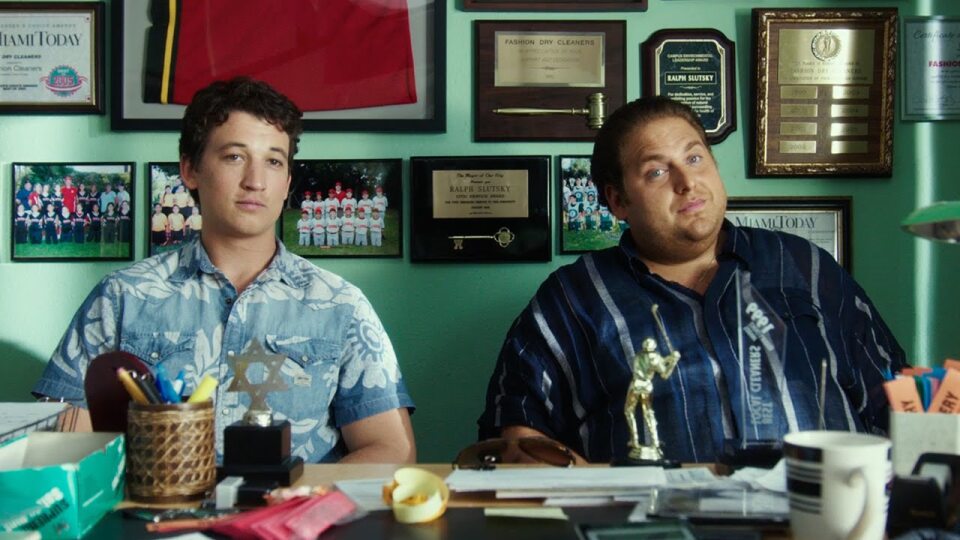
These guys have been written about in the New York Times and Rolling Stone. They were criminally charged so there is an indictment. In meeting with them, what did you find that hadn't been written about or revealed that ended up being in the movie?
I think this is really so interesting because when I began the process, I said, I want to go out and meet these guys. And I think there was some reluctance. I think there was a little feeling of, why do you need to meet these people? Aren't you a writer and aren't you going to create this? We've got the "Rolling Stone" article. I said, the "Rolling Stone" article was interesting but the "Rolling Stone" article comes from a place of political reporting, right? It's looking at what happened to them and saying, did the U.S. government know? Was there a conspiracy? Or were these just patsies and front guys? None of that was about their personal relationship. None of that was how they got into the business. None of that explained how somebody who was 17 or 18 years old became a gun dealer and later a gun runner. So it didn't answer any of the fundamental questions that I needed to make a human story that would be the way in to telling a more procedural story.
What these guys were able to do was pretty remarkable. They had no experience, they had no training, they had no contacts and yet they were very quickly getting contracts worth tens of millions of dollars from the Pentagon. Was that what attracted you to the story or was there something bigger about what that story said that really drew you in?
There's a line that I don't think is in the final movie that I wrote that's based on something that a contractor said to me in Baghdad back in 2004, which is, I've been waiting for this my whole life. The money is pouring out like it's pouring out of firehoses and all you have to do to get rich is go get a bucket and stand there. When this story first broke out in the New York Times I was interested in writing about these guys because I thought, this is sort of the intersection of crazy millennial ambition. I don't have to know anything. I don't have to have any skills. All I have to have is chutzpah, ambition and I'm smarter than everybody else. I'm going to be able to work the system and I'm going to be a billionaire. Look at the guy that started blackwater when he was 27. His company is worth a billion dollars now. Why can't that be me? That was an entire millennial attitude that I thought was a perfect intersection with the insane amount of money that was being spent by the U.S. government.
When you hired a smuggler to drive you from Jordan to Baghdad through Fallujah. When you arrived, did somebody say, you drove through the triangle of death?
Yes. Not only is it true, when I got there the driver told all these people that I had actually talked to insurgents in Fallujah and that they had chased us. And they all though it was hysterical. They were like, we never thought you'd come here. We never thought you'd actually show up. We never thought you'd drive through the triangle of death to come get our life right. You moron, you idiot. You're a lunatic. You're our kind of guy. We want to be in business with you.
What's harder, driving through the triangle of death or negotiating all the strong personalities in a studio to get a movie made?
I'd drive through the triangle of death any day. I would choose the triangle of death any day. Much much easier. Faster, more exciting, potentially life-threatening, but much better. And I had a great experience doing this. It's just, to try to make something great and pure and real is always a challenge when you've got lots and lots of people involved in these things. But I think we did it with this one.
The US embargo against Cuba doesn't stop illicit TV providers
It's a Tuesday evening at Rafael Valdivia's apartment in Havana. Soon, a delivery man arrives. He pulls out a small hard drive, which Valdivia connects to his computer. He begins to select from a load of digital files: current movies, documentaries, soap operas, video games, cartoons, American TV series with Spanish subtitles. This is how many Cubans get their daily entertainment.
“El Paquete Semanal,” or "The Weekly Package," is delivered all over the island through a network of distributors. This delivery man is named Nelson. I ask him where the hard drive is assembled. He says there are several “production houses.” One compiles the movies, another one the video games, another one the soap operas, and so on. Then he adds:
Apparently, the government has no control over it. So they haven’t been able to get rid of it. Believe me, if they could get rid of it, they would have done it already.
The package costs the equivalent of $2. Some experts estimate that about six million people enjoy it every week. That’s more than half the population of Cuba. About 75 percent of the content came out just the week prior, on dozens of entertainment channels from around the world.
NELSON: Peruvian, Chilean, American, Spanish TV — it’s a compilation. They gather soap operas, documentaries, TV shows, news magazines — they create a compendium and then it’s distributed.
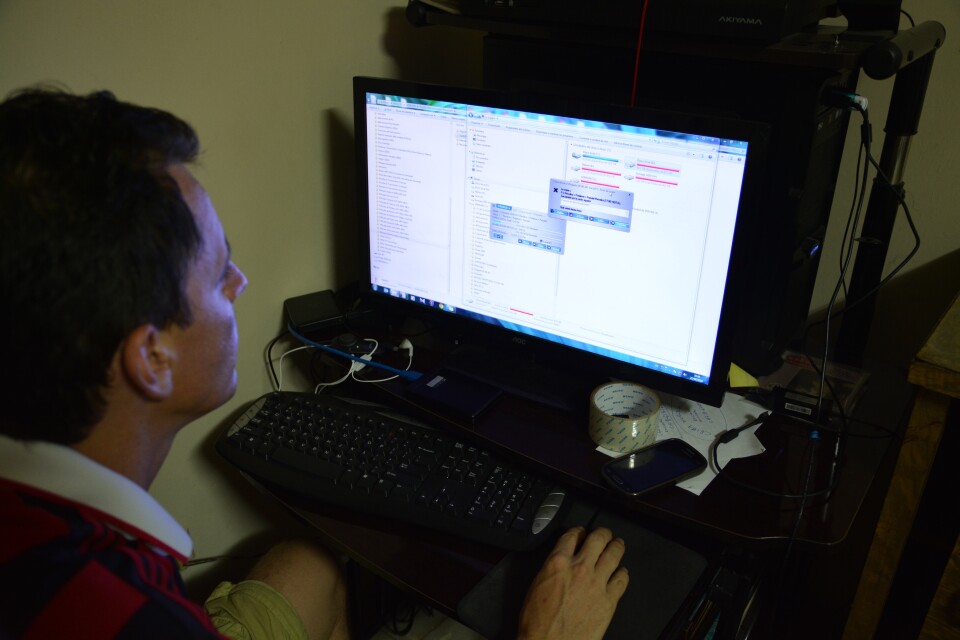
Nelson has distributed content for the past three years. He says Cubans consume all sorts of entertainment, like everyone else.
Cartoons are the most popular. But also soap operas, Discovery Channel programs are also very popular. And, of course, movies — all the new movies that come out, the Hollywood premieres.
As I sit with Valdivia, he’s browsing through the contents of “El Paquete Semanal” and comes across a very popular show in Cuba.
The one I like best is “The Voice” — but the American version, not the others. It’s the one that has the highest standards, not just because of the jury, but for the way it’s conceived.
I ask Nelson, the delivery man, how many gigabytes of content are in the hard drive.
Almost a terabyte, every week. Of course, in one terabyte you can fit in every kind of taste.
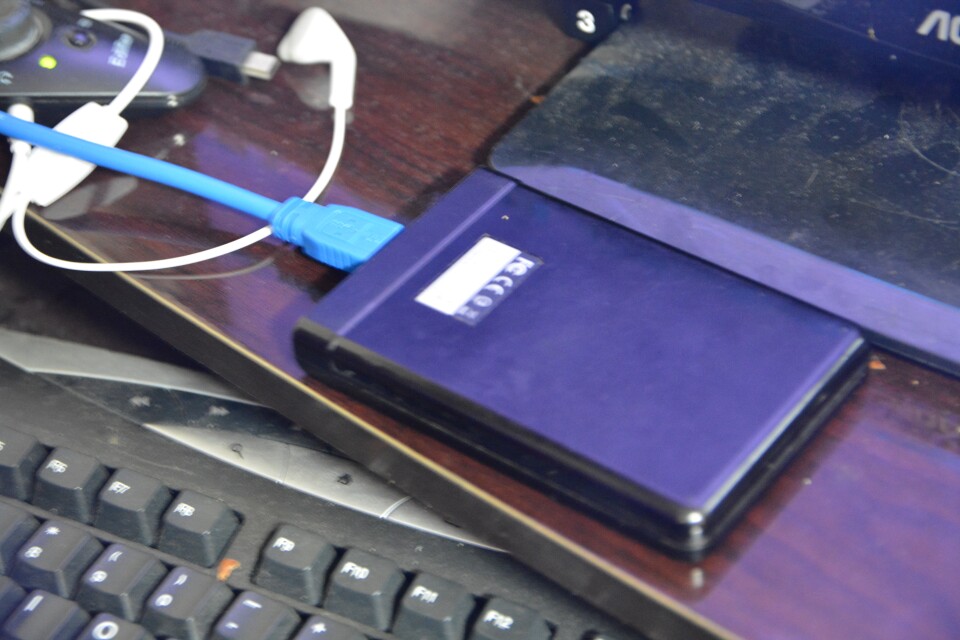
Nelson says he visits between 25-30 clients every week. He starts delivery on Tuesday and works all week. On Sunday, he deletes the files from his hard drive. Then, on Monday, he gets the updated version of the package and starts all over again.
It’s the type of business that takes up a lot of time. People have to copy the contents and it takes 1-2 hours to do it, so I can’t service a lot of people. Plus not everyone has a good computer. I have clients in Old Havana, and in areas where some of the high-level government officials live.
Valdivia says whether it provides entertainment or information, the main purpose of the “Weekly Package” is to satisfy the need for content in Cuba.
Because we’re living in a very visual era, and with the lack of Internet connectivity we have, plus the technological limitations, plus all the external and internal problems, it makes people want to look in the "weekly package" for the things they cannot find on TV or radio in Cuba.
I also visit with my longtime friend Dago, who’s a regular consumer of the delivery service. He says last year a reporter from Forbes Magazine came to Havana to interview the man behind “El Paquete Semanal.”
So, if Forbes Magazine was focused on this guy, this guy [has] gold, real solid gold in his hand. Maybe in a normal country he’s a pirate. But, there is no law [in Cuba]. So there’s no problem.
It’s no problem now. But everyone knows it will be when the U.S. embargo against Cuba is lifted.
How Viacom's power struggle trickled down to Paramount Pictures
If you went to the movies this weekend, you probably didn’t see “Ben-Hur,” Paramount Pictures' big-budget remake of the 1959 sandal-and-sword epic.
Many are calling the film one of the summer’s biggest flops: it cost $100 million to make, but opened to just $11.4 million at the box office.
Even though MGM bore the brunt of the budget for the film, it’s still not good news for fellow distributor Paramount, which has had a string of duds this year, including "Zoolander 2," "Whiskey Tango Foxtrot" and "Teenage Mutant Ninja Turtles 2."
To better understand the studio’s woes, we called on
, senior film and media reporter at Variety, and asked him what has gone wrong at Paramount and its parent company, Viacom. He began by summarizing the studio's recent struggles.
Interview Highlights:
Paramount has a real content problem, and at some level, you can say it starts at the top. It’s, in some ways, an indictment of the leadership of Philippe Dauman at Viacom, Paramount’s parent company, which seemed to be more interested in short-term profitability and not growing for the long term [by] buying things like Marvel or exciting new forms of intellectual property that really could’ve elevated it to the top ranks of the movie studios. Instead, what you have is one misfire after another … so it’s been a very bad summer for Paramount. They’re nowhere close to say a Disney or even a Warner Brothers in terms of their ability to tap into the zeitgeist.
Paramount's parent company, Viacom, has been embroiled in a power struggle over control of the company, and Lang says the studio has been affected by that bigger fight.
I’ve talked to people who have said that they’re hesitant to put their projects at Paramount because they’re not sure who’s even going to be in control of the studio. And so it just creates an enormous amount of uncertainty that trickles down throughout the Viacom media empire — and uncertainty is not good for creativity.
This weekend, Viacom announced that CEO Philippe Dauman has accepted a $70 million settlement and will step down from the company’s leadership. Lang says that settlement signals Shari Redstone’s control of the company and its future.
She will at some level decide: Will the Redstone family continue to have a controlling stake in the company, or will they sell Viacom to another player, be it an Amazon, a Netflix, Alibaba, or some other deep pocketed content player? And once the issue of control is permanently settled, then folks will have a clear sense of what kind of company that Viacom [will] be going forward.



